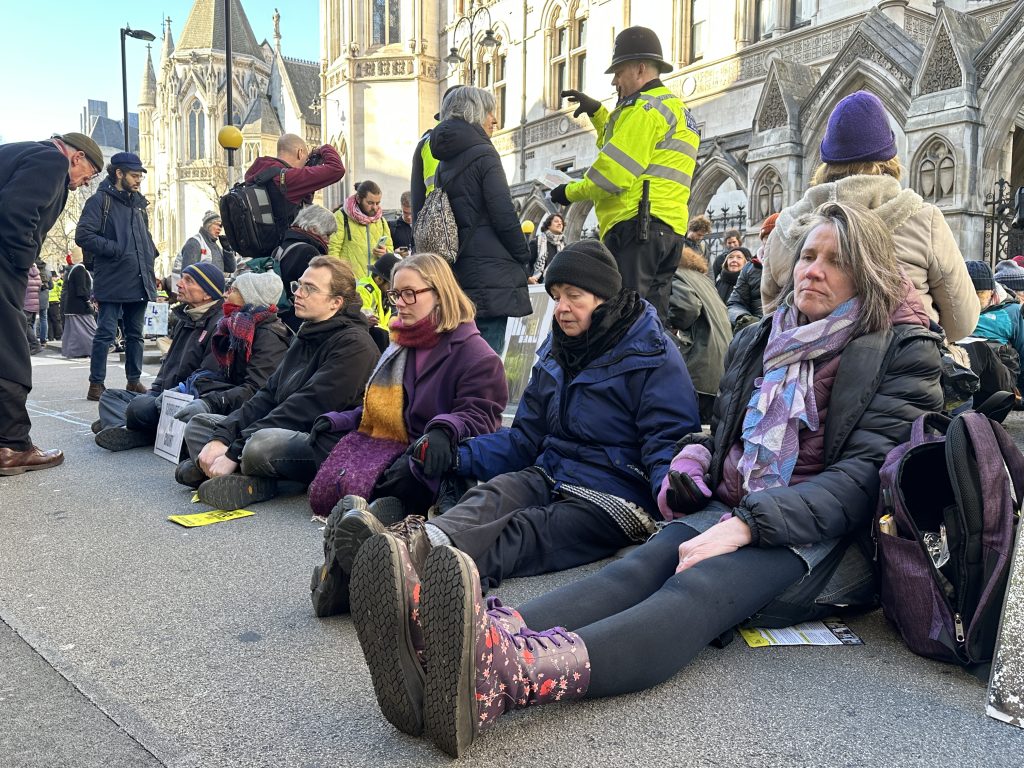Over 1000 people block the Strand outside the mass appeal hearing for 16 Just Stop Oil supporters
Over a thousand people took part in a peaceful demonstration blocking the road outside the Royal Courts of Justice yesterday. Inside, the appeal against the draconian sentences given to 16 Just Stop Oil supporters last year is continuing. The mass appeal concerns 16 supporters with combined sentences of 41 years handed down between July and September 2024.
All 16 Just Stop Oil supporters were jailed in the months following the publication of a report to the government written by ‘Lord Walney’, a paid lobbyist for the oil and arms industry that called for groups such as Just Stop Oil and Palestine Action to be banned in a similar way to terrorist organisations.
Police arrested at least one before the demonstration. Another was arrested after the protest ended. Celebrities such as Chris Packham, Hugh Fearnley-Whittingstall and Jonathan Pie could be seen peacefully blocking the road in defiance of swarms of police. Meanwhile, solidarity demonstrations have occurred in countries around the world, including Canada, Sweden, Switzerland and New Zealand.
A Just Stop Oil spokesperson said:
We are deeply grateful to the 1,000 peaceful protestors who turned up at the Royal Courts of Justice to show solidarity with Just Stop Oil supporters appealing their sentences. They know that our broken political system is on trial today. This case is not about whether peaceful climate defenders deserve to be punished with long prison sentences. It is about whether it is acceptable in a democracy to allow wealthy fossil fuel executives and paid lobbyists, presented as ‘independent’ government advisors, to dictate our laws, pervert our criminal justice system and silence all opposition to destructive business practices.
Just Stop Oil supporters in prison are political prisoners. They are not there because they disrupted or harmed everyday people – if that were the case, the water company bosses, Post Office execs and those responsible for the Grenfell disaster would be behind bars. Our supporters are in prison because Just Stop Oil threatens the profits of the fossil fuel industry.
We say to the government you can lock us up but more people will take our place as the extreme consequences of climate breakdown become more apparent. These 16 were jailed after demanding an end to new oil and gas, something which is now government policy. Just today, a Scottish court has found the development of the largest untapped oil and gas reserves in the UK is unlawful. In other words, Just Stop Oil is right. This is something that will continue to be abundantly clear as this crisis unfolds. We must ensure our leaders are held to account and do the right thing. That is why it is important to step-up and join us outside parliament this April.

Yesterday in the Court of Appeal, Danny Friedman KC and Brenda Campbell KC acting for the appellants argued that the sentences passed down on the 16 Just Stop Oil supporters were unlawful. In particular the sentences did not take account of relevant case law, the conscientious motivations of the Just Stop Oil supporters, their rights under articles 10 and 11 of the European Convention on Human Rights (ECHR) and the UK’s obligations under the Aarhus convention. The appeal is being heard by Lady Chief Justice Baroness Carr, Mr Justice Lavender and Mr Justice Griffiths.
The barristers acting for the appellants said that if these sentences were upheld it would represent a “paradigm shift on criminal law sentencing”. Those involved in the miners strike, the anti-fascist protests in the 1930s and even Swampy in the 1990s, did not face the kind of sentences that the nonviolent protesters today face.

Many of the 16 are in prison under the Public Order Act, legislation that was drafted with the aid of the Policy Exchange. This organisation has received funding from Exxon Mobil, one of the world’s largest oil companies, which has a long history of science denialism and funding disinformation, bribing politicians and manipulating media discourse. This legislation did not receive parliamentary assent, and was forced into law using special powers from the time of Henry VIII. This was subsequently found to be unlawful.





